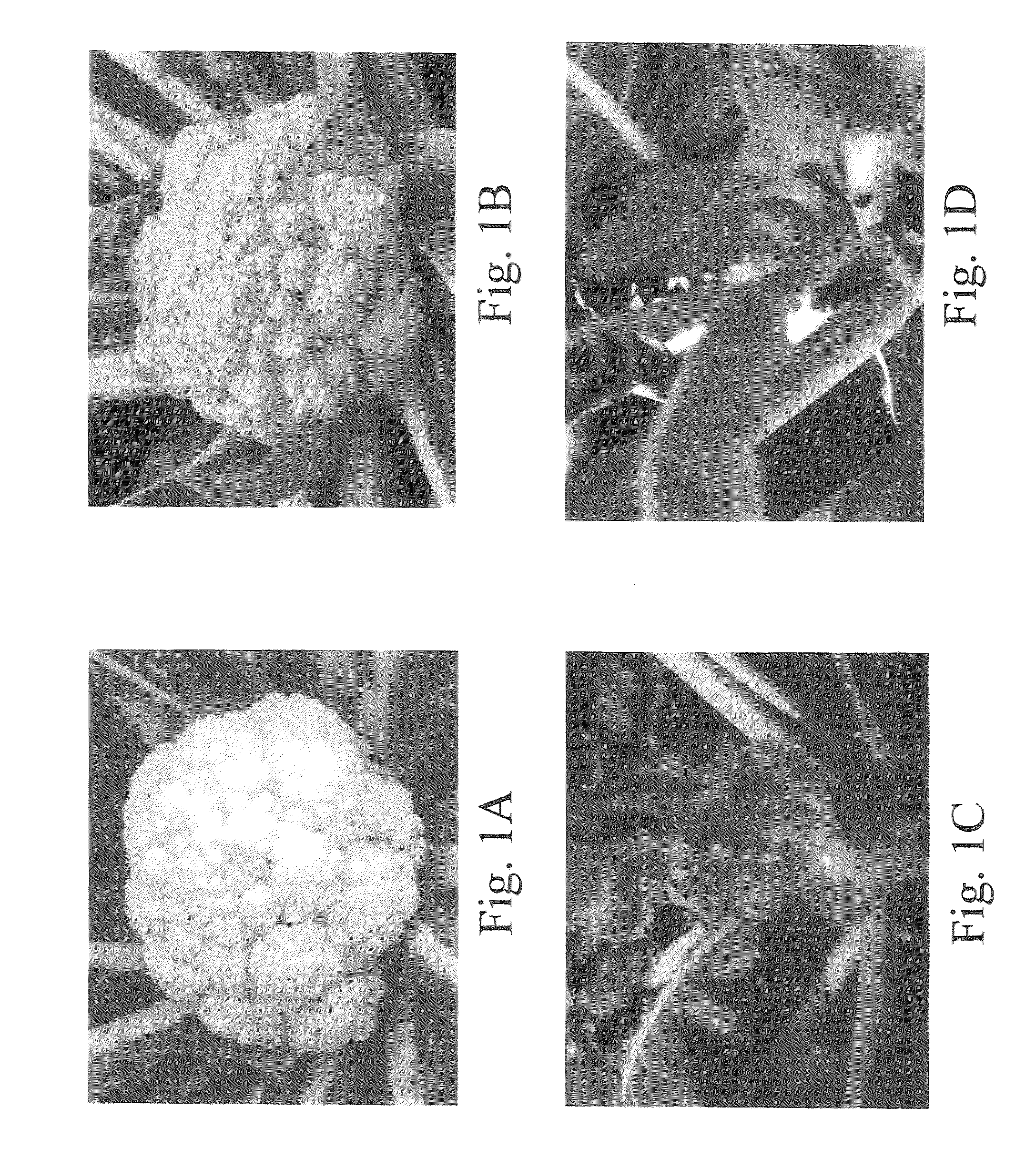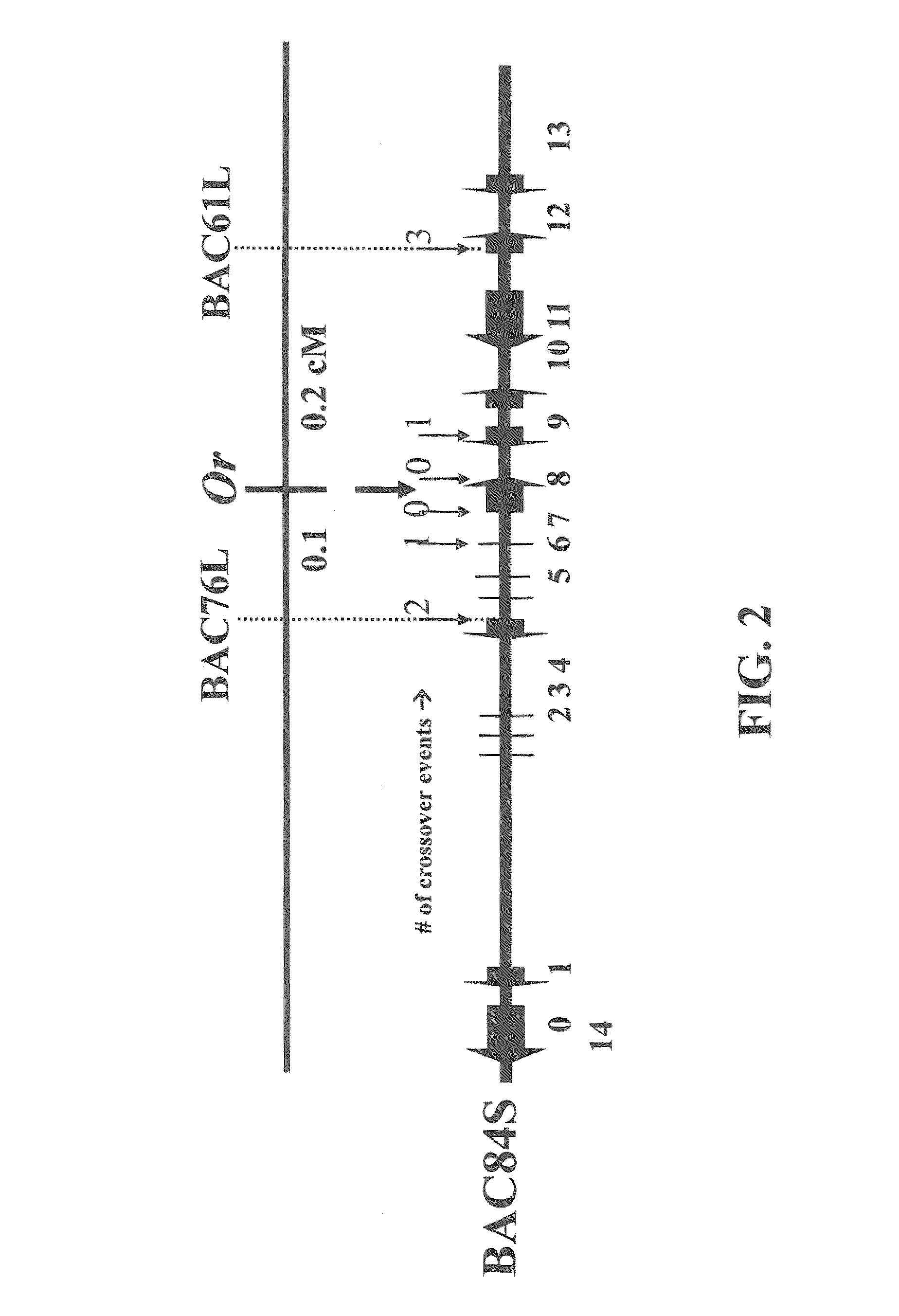Or gene and its use in manipulating carotenoid content and composition in plants and other organisms
a technology of carotenoid content and composition, applied in the field of genes and or genes, can solve the problems of poor immune function and early death, and achieve the effect of enhancing carotenoid content and enhancing carotenoid conten
- Summary
- Abstract
- Description
- Claims
- Application Information
AI Technical Summary
Benefits of technology
Problems solved by technology
Method used
Image
Examples
example 1
Plant Materials
[0093]The cauliflower varieties used in this study include a wild type (WT, genotype oror) cultivar “Stovepipe”, and a homozygous mutant (Or, genotype OrOr) line “1227”. Heterozygous plants (Oror) were produced from a cross between these two cultivars. Plants were grown in a greenhouse at 20° C. with 14 h / 10 h light dark regime. Leaf and curd samples for RNA and DNA extraction as well as for HPLC analysis were harvested, frozen in liquid nitrogen, and stored at −80° C. until use.
example 2
Nucleic Acid Analysis
[0094]Total genomic DNA was isolated from leaf tissues of cauliflower plants either following the method of Riede and Anderson (1996. Crop Sci. 36: 905-909) or by a modified minipreparation according to Dellaporta et al. (1983. Plant Mol. Biol. Rep. 1: 19-21). Genomic DNA was digested with restriction enzymes, separated on 0.8% agarose gels, and blotted onto Hybond N+ membranes (Amersham). Probes were radiolabeled by the method of Feinburg and Vogelstein (1984. Anal. Biochem. 137: 266-267). Pre-hybridization, hybridization, and washing of the membranes were conducted as previously described (Li and Garvin, supra).
[0095]Total RNA was extracted using Trizol reagent (Invitrogen). For Northern blot analysis, RNA samples (20 μg each) were separated on a formaldehyde agarose gel and transferred onto Hybond N+ membrane (Amersham). Equal loading of the samples were monitored by ethidium bromide stained gel, and verified by probing the blot with actin or 18s rRNA. The pr...
example 3
Identification of a Single Candidate Gene for Or
[0096]Previously, we identified a single BAC harboring the Or locus (Li et al., supra). The entire BAC clone (BAC84S) was sequenced by MWG sequencing service (High Point, N.C.) and fifteen putative genes were identified based on the computer program of GENSCAN (http: / / genes.mit.edu / GENSCAN.html) (FIG. 2). The F2 recombinant plants were used for fine mapping to identify candidate genes cosegregating with Or. Fine mapping of the putative genes between BAC76L and BAC61L marker sequences identified only one gene that cosegregated with the Or locus. Sequence comparison of this gene from the WT and the Or mutant revealed a 4.4-kb retrotransposon insertion in the mutant (FIG. 3). Thus, fine genetic mapping, along with a large insertion in the mutant allele, unequivocally defined a single candidate gene for Or.
PUM
| Property | Measurement | Unit |
|---|---|---|
| temperature | aaaaa | aaaaa |
| Tm | aaaaa | aaaaa |
| temperatures | aaaaa | aaaaa |
Abstract
Description
Claims
Application Information
 Login to View More
Login to View More - R&D
- Intellectual Property
- Life Sciences
- Materials
- Tech Scout
- Unparalleled Data Quality
- Higher Quality Content
- 60% Fewer Hallucinations
Browse by: Latest US Patents, China's latest patents, Technical Efficacy Thesaurus, Application Domain, Technology Topic, Popular Technical Reports.
© 2025 PatSnap. All rights reserved.Legal|Privacy policy|Modern Slavery Act Transparency Statement|Sitemap|About US| Contact US: help@patsnap.com



